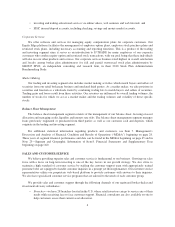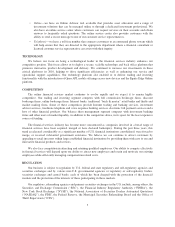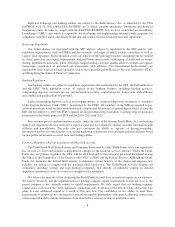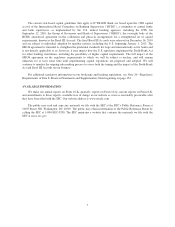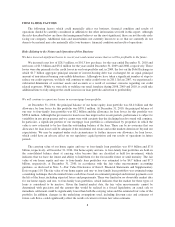eTrade 2010 Annual Report Download - page 17
Download and view the complete annual report
Please find page 17 of the 2010 eTrade annual report below. You can navigate through the pages in the report by either clicking on the pages listed below, or by using the keyword search tool below to find specific information within the annual report.• establishment of a Consumer Financial Protection Bureau with broad authority to implement new
consumer protection regulations and, for banks and thrifts with $10 billion or more in assets, to
examine and enforce compliance with federal consumer laws; and
• increases in the minimum reserve ratio for the FDIC’s deposit insurance fund to 1.35%.
Under the legislation, the OTS will be abolished by April 2012 and its functions and personnel distributed
among the OCC, FDIC and the Federal Reserve. Primary jurisdiction for the supervision and regulation of
federal thrifts, such as the Company’s three thrift subsidiaries, will be transferred to the OCC; supervision and
regulation of savings and loan holding companies, including the Company, will be transferred to the Federal
Reserve. Although the Dodd-Frank Act maintains the federal thrift charter, it eliminates certain benefits of the
charter and imposes new penalties for failure to comply with the qualified thrift lender test. The Dodd-Frank Act
also requires all companies, including savings and loan holding companies that directly or indirectly control an
insured depository institution to serve as a source of strength for the institution.
The Dodd-Frank Act also creates a new independent regulatory body, the Consumer Financial Protection
Bureau, which has been given broad rulemaking authority to implement the consumer protection laws that apply
to banks and thrifts and to prohibit “unfair, deceptive or abusive” acts and practices. For all banks and thrifts with
total consolidated assets over $10 billion, including E*TRADE Bank, the Consumer Financial Protection Bureau
has exclusive rulemaking and examination, and primary enforcement authority, under federal consumer financial
laws and regulations. In addition, the Dodd-Frank Act permits states to adopt consumer protection laws and
regulations that are stricter than those regulations promulgated by the Consumer Financial Protection Bureau.
For us, one of the most significant changes under the new law is that savings and loan holding companies
such as our Company for the first time will become subject to the same capital and activity requirements as those
applicable to bank holding companies. In addition, we will be subject to the same capital requirements as those
applied to banks which requirements exclude, on a phase-out basis, all trust preferred securities from Tier 1
capital. While the Dodd-Frank Act provides for a five year phase-in period for these new capital requirements, it
requires holding companies like ours, as well as all of our thrift subsidiaries, to be both “well capitalized” and
“well managed” in order to be able to engage in certain financial activities such as market making and securities
underwriting as soon as the OTS is abolished. We fully expect to meet these capital requirements and to have our
Company and its thrift subsidiaries qualify as both “well capitalized” and “well managed” within the applicable
phase in periods. However, if we are unable to satisfy these requirements, we could be subject to activity
restrictions and other negative regulatory actions. In addition, it is possible that our regulators may impose more
stringent capital and other prudential standards on us prior to the end of the five year phase-in period.
The Dodd-Frank Act requires various federal agencies to adopt a broad range of new rules and regulations,
the details, substance, and impact of which may not be known for months or years. It is difficult to predict at this
time what other specific impacts the Dodd-Frank Act and the yet-to-be-written rules and regulations may have on
us. However, given that the legislation is likely to materially change the regulatory environment for the financial
services industry in which we operate, we expect at a minimum that our compliance costs will increase.
The OTS may request that we raise additional equity to support E*TRADE Bank or to further reduce debt. If we
are unable to do so, we could face negative regulatory actions. Any such actions could have a material negative
effect on our business.
In early 2009, the OTS advised us, and we agreed, that we needed to raise additional equity capital for
E*TRADE Bank and reduce substantially the amount of our outstanding debt in order to withstand any further
deterioration in current credit and market conditions. In furtherance of these objectives, we completed the Debt
Exchange, the Public Equity Offering and the At the Market Common Stock Offering in 2009. Pursuant to
memoranda of understanding that we and E*TRADE Bank entered into with the OTS, we and E*TRADE Bank
are required to submit to the OTS and implement both capital and de-leveraging plans to continue to monitor and
address these matters.
14


